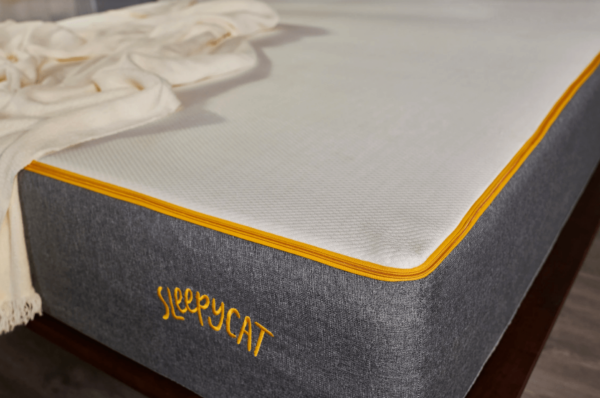Take Too Long To Fall Asleep? Here’s How To Snooze In 10, 60 or 120 Seconds
April 9, 2021 | Written by SleepyCat Team
How many nights have you spent trying too hard to fall asleep in vain?
If you can’t count that on your fingers, you might fall into the category of people for whom falling asleep is a task.
So if at this point a tiny voice in your head is vehemently screaming, “So me!”, you’re in luck. Why? Because we’re here to help you fall asleep faster than the speed of light! Okay, that might be an exaggeration. But won’t you say 10, 60 or 120 seconds is super-fast?! We can hear you gasp in disbelief!
But before we reveal the secret, let’s talk about why sleep can elude you sometimes
The reason why sleep doesn’t come to you sooner
On average, it’s supposed to take a healthy adult no more than 10 to 20 minutes to slip into the land of snooze and snores.
But we both know it’s taken you longer than that. Why?
You might be overthinking

Overthinking is like stepping into a long-winding, and perhaps, unending rabbit hole. That embarrassing memory from 7 years ago does hold the potential to keep you up for hours. So does stressing about your everyday life.
Or maybe blue light is getting in the way
Exposure to any kind of light for that matter. Blue light can mess with your circadian rhythm, likely delaying sleep as well as reducing the number of Zzzs you catch each night.
Let’s fix this mess, shall we? Keep reading to find out how you can sleep in a jiffy!
How to doze off in 10 seconds

This 10-second snooze-off is also known as ‘the military method’ due to its extensive use in the US Navy.
In this method, pilots were trained to sleep within 2 minutes or less. It took them 6 weeks to get it right but they got there! So can you!
Here’s how:-
- Lay down and relax your entire face. Take deep breaths to do so.
- Let your shoulders and hands drop to your side to release tension in the body. · Exhale slow and deep, relaxing the rest of your body.
- Get the thoughts out of your head by thinking of a calming scene for 10 seconds. Say the phrase “don’t think” in your mind for 10 seconds if you find yourself thinking. And that’s all it takes! You’ll find yourself snoring in 10 seconds!
How to doze off in 60 seconds
The 4-7-8 breathing technique is what it takes to nod off in 60 seconds. A mix of meditation and visualization is particularly good for you if you stress too much.
- Place your tongue at the roof of your mouth and part your lips to let out a whooshing sound as you exhale.
- Now close your mouth and breathe in through your nose, counting up to 4 as you inhale. · Hold your breath for 7 seconds.
- Release your breath with a whooshing sound for 8 seconds.
- Repeat this mindlessly without being alert.
- Complete 4 cycles and feel your body sink into deep relaxation-induced sleep.
How to doze off in 120 seconds
To visit the space of sweet slumber in 120 seconds, you can try a couple of things.
Try to stay awake

Might sound counteractive, but if you tell yourself to stay awake, there’s a good chance you’ll fall asleep faster. Reverse psychology really works, huh?
Visualize a place that brings you calm
Sometimes your mind can run wild, going into thought overdrive that can, quite frankly, shoo sleep away. To calm your mind and initiate restfulness, you can visualize a soothing place. Many swear by this method, claiming it works.
A 2002 Oxford University study showed that sleepers who indulged in what’s termed as “imagery distraction” fell asleep quicker than those who didn’t.
A good mattress can make falling asleep a lot easier
Often tossing and turning in an uncomfortable bed proves to be the real culprit behind delayed sleep.
What do you do in such cases?
Invest in a good mattress.

Especially if you sleep hot. Because in a hot and humid country like India, good sleep can anyway seem like a distant dream.
However, you can fix all that by getting a cooling mattress. Like our Ultima mattress! Ultima’s CoolTEC™ fabric helps you sleep cool so you can snore faster. You can read plenty of our mattress reviews to know that it works.
Featured Products
Cloud Pillow
Get the luxury and comfort of a hotel pillow at home. This is supersoft, lighweight and has a smart zipper for adjusting its firmness.
200 TC Percale Fitted Bedsheet Set
Make your bed within minutes, thanks to elastic corners which make it super easy to tuck perfectly!
300 TC Sateen Pillow Cases
Combining the buttery smoothness of sateen fabric with a refined, seamless design, these pillow covers offer a luxurious look free from visible zippers or buttons.
Jersey Fitted Sheets
Get the softest feel with its knit fabric that doesn’t wrinkle & stays snug with it’s elastic edges
